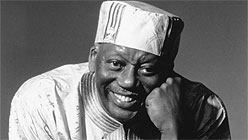It’s America in the early 1930s and Randy Weston is growing up in New York City, where all of the era’s social changes — including the Great Depression and an increasing influx of non-European immigrants — are evident to both him and his parents. In fact, according to Weston’s biography, African Rhythms, Weston’s father, a restauranteur of Jamaican descent who was born in Panama, tells his son, “Never forget what you are. You’re an African. Though you were born here in the United States, you are an African. An African born in America, do you understand? Wherever you travel all over this planet, you must always come back to her.”
In retrospect, it’s easy to understand why Weston would, during a stellar career as a jazz pianist, fuse African rhythms and musical structures into the American art form he first learned in the clubs of New York. And it’s easy to understand why in the ’60s and ’70s Weston would settle in Africa, making a home for himself in Tangier, Morocco like other American expatriates, including Paul Bowles and William Burroughs. He was different from Bowles and Burroughs in two crucial respects: Weston was a family man, taking his children with him to the continent; and Weston is black, his mission in Africa was to showcase the deep connections between Africa and the African diaspora. That’s still his mission, which is why Weston is in such a state of despair. In the United States, he says, new generations of Americans lack even a passing understanding of Africa’s historic importance to jazz and other cultural traditions that we now think of as strictly “American.”
“If more people understood the contributions of Africans to civilization, it’d be a different world,” Weston tells me in a phone interview from his home in New York. “People know little about Africa’s contribution to America. Slavery was a sad story, but a beautiful story came out of it through the emergent blues and jazz traditions.”
Now 86, Weston has been in the top tier of his profession for the past 50 years, and he continues to accrue the honors of someone who has no plans to stop. Last year, the John Simon Guggenheim Memorial Foundation named him a fellow in its prestigious program. The year before, Harlem’s Apollo Theater honored Weston for his long career. And the year before that, the American Society of Composers, Authors and Publishers (ASCAP) inducted Weston into its Jazz Wall of Fame, putting him in the same company as Billie Holiday, Coleman Hawkins and Charlie Parker. Weston had personal connections to all three jazz icons (as an up-and-coming artist, Weston once performed for Parker at the house of drummer Max Roach). More than any U.S. jazz artist still touring, Weston is a living bridge to America’s jazz past, and to the promise that jazz can regain a popular foothold in the United States.


